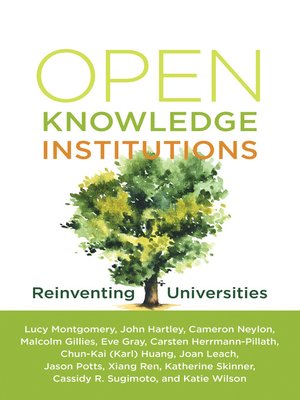
Sign up to save your library
With an OverDrive account, you can save your favorite libraries for at-a-glance information about availability. Find out more about OverDrive accounts.
Find this title in Libby, the library reading app by OverDrive.



Search for a digital library with this title
Title found at these libraries:
| Library Name | Distance |
|---|---|
| Loading... |
The future of the university as an open knowledge institution that institutionalizes diversity and contributes to a common resource of knowledge: a manifesto.
In this book, a diverse group of authors—including open access pioneers, science communicators, scholars, researchers, and university administrators—offer a bold proposition: universities should become open knowledge institutions, acting with principles of openness at their center and working across boundaries and with broad communities to generate shared knowledge resources for the benefit of humanity. Calling on universities to adopt transparent protocols for the creation, use, and governance of these resources, the authors draw on cutting-edge theoretical work, offer real-world case studies, and outline ways to assess universities’ attempts to achieve openness.
Digital technologies have already brought about dramatic changes in knowledge format and accessibility. The book describes further shifts that open knowledge institutions must make as they move away from closed processes for verifying expert knowledge and toward careful, mediated approaches to sharing it with wider publics. It examines these changes in terms of diversity, coordination, and communication; discusses policy principles that lay out paths for universities to become fully fledged open knowledge institutions; and suggests ways that openness can be introduced into existing rankings and metrics. Case studies—including Wikipedia, the Library Publishing Coalition, Creative Commons, and Open and Library Access—illustrate key processes.
In this book, a diverse group of authors—including open access pioneers, science communicators, scholars, researchers, and university administrators—offer a bold proposition: universities should become open knowledge institutions, acting with principles of openness at their center and working across boundaries and with broad communities to generate shared knowledge resources for the benefit of humanity. Calling on universities to adopt transparent protocols for the creation, use, and governance of these resources, the authors draw on cutting-edge theoretical work, offer real-world case studies, and outline ways to assess universities’ attempts to achieve openness.
Digital technologies have already brought about dramatic changes in knowledge format and accessibility. The book describes further shifts that open knowledge institutions must make as they move away from closed processes for verifying expert knowledge and toward careful, mediated approaches to sharing it with wider publics. It examines these changes in terms of diversity, coordination, and communication; discusses policy principles that lay out paths for universities to become fully fledged open knowledge institutions; and suggests ways that openness can be introduced into existing rankings and metrics. Case studies—including Wikipedia, the Library Publishing Coalition, Creative Commons, and Open and Library Access—illustrate key processes.







